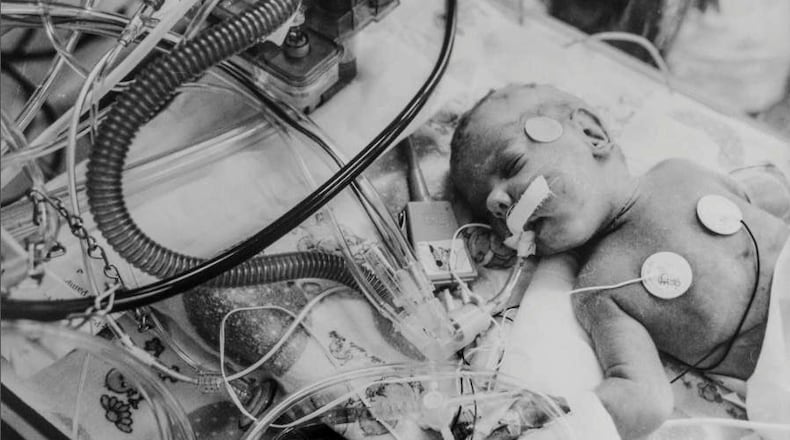In 1989, The Atlanta Journal-Constitution published a series by Jane O. Hansen that explored the abuse and neglect of children in Georgia's child welfare system. "Suffer the Children" led to legislative action the following year. The series won numerous awards and was a nominee for the 1990 Pulitzer Prize in Public Service.
Here are the stories that comprised the original "Suffer the Children" series:
PART 1 (June 4, 1989): Georgia operates a child welfare system where failures are hidden and where children suffer and sometimes die in virtual secrecy.
PART 2 (June 5, 1989): Vale Henson, a DeKalb County social worker, worries that one day, amid the litter of her clients' lives, she will find the body of a dead child.
PART 3 (June 6, 1989): In the crowded confines of the Fulton County Emergency Shelter, babies share space with adolescent drug dealers in protective custody.
PART 4 (June 7, 1989): The state of Georgia said the foster care it provided Michael Steven Harmon as a child made him a bad risk as a parent. And so they took custody of his baby.
PART 5 (June 8, 1989): Many people want to adopt Georgia's unwanted children, but red tape and bureaucratic foul ups leave some children stranded and debilitated.
PART 6 (June 9, 1989): For abused children summoned to testify in court, the criminal justice system can be as brutal and indifferent as a drunken parent.
PART 7 (June 10, 1989): Analysis — In Georgia, you can kill your child's mother and still be regarded by the courts as an acceptable parent.
--------------------------
This introductory editor's note was published in a reprint of the series:
The stories contained here are often painful to read. Usually, the public is not exposed to the intimate suffering of abused and neglected children. Usually, confidentiality rules assure that child welfare decisions are made behind closed doors.
Staff writer Jane O. Hansen opened those doors in her series, "Suffer the Children." She revealed a world where confidentiality often does more to cover the failures of the bureaucracy than to protect the privacy of child victims, where being rescued from an abusive natural home is sometimes just a prelude to abuse in a foster home.
Her findings were compelling and disturbing:
* Fifty-one children in Georgia died last year while under the "protection" of the state's child welfare system. One example: two toddlers whose drug-addicted father took them for a walk one evening and bashed their heads to the pavement; for eight months before the incident, the family had been the subject of repeated complaints to child welfare authorities.
* Suspicious deaths of children are routinely signed off in this state by coroners as natural or accidental with no investigation or autopsy. One example: the infant daughter of a drug-abusing mother died after being rolled across the floor like a bowling ball; the coroner listed the case as Sudden Infant Death Syndrome.
* Children in Georgia are routinely forced to sit in courtrooms crowded with accused felons, waiting for hours to be called to testify in preliminary hearings. One example: A 2-year-old was forced to wait three hours before being called to appear in a preliminary hearing on an alleged case of sexual abuse; when the call finally came, the child was asleep.
* Overcrowded temporary shelters for abused or neglected children have become dumping grounds for children the state has no other place for and permanent homes for children it can't place. One example: In a shelter serving Atlanta, a mentally retarded 15-year-old, who openly masturbates and who is dying from a fatal disease, sits watching Sesame Street surrounded by toddlers; he has been at the temporary shelter a year.
* Foster care in Georgia has become a system where children are sometimes more likely to be abused than if they remain with their natural parents, and where those who are raised by the state are often considered damaged goods. One example: A 19-year-old who spent his life in a succession of foster homes had his first-born child taken from him and his parental rights severed, in part because the state believed that growing up in foster care had made the father an unfit parent.
* State officials were as affected by the disclosures in the series as the hundreds of readers who called or wrote letters following publication. The comments of Georgia Gov. Joe Frank Harris reflected the sentiments of many:
"The newspaper's articles threw a glaring light on the atrocities visited daily on innocent babies and children," said Gov. Harris. "I feel both a tremendous sadness and a moral outrage that some in our society place such little value on children and that the systems designed and funded to protect them so often do not work."
Both Democratic and Republican state leaders said they expected a package of legislation would be introduced when the General Assembly convenes in January. Grass roots groups of parents already have cropped up to encourage that process.
While some of the problems in Georgia's child welfare system are unique to Georgia, many are not.We encourage you to take a close look at one state's failures, some of its successes and its search for solutions. "Suffer the Children" makes it clear child protection today it too often an illusion. Something must be done to make it a reality.
— The Editors
The Latest
Featured


